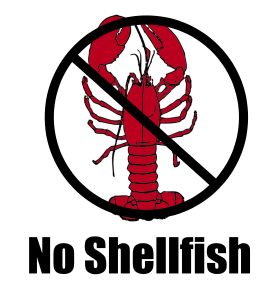



Two percent of American adults have a shellfish allergy, making it one of the most commonfood allergies in America. Less than one percent of children have a shellfish allergy, making it more likely to occur in adulthood, unlike many food allergies which typically start in childhood. Shellfish allergies are life-long once developed and can be severe for some. Everyone’s reactions are different when exposed to shellfish. Some only react to certain kinds of shellfish. Reactions can vary from mild to severe. Your doctor can do tests if you think you may have an allergy to shellfish.
People with a shellfish allergy react to the protein tropomyosin. Histamines are released by the body triggering symptoms, which can be mild or severe, and sometimes the reaction is not immediate. Common symptoms of shellfish allergy include:
Severe cases can cause anaphylaxis, which includes rapid pulse, extreme dizziness, swollen throat and a severe drop in blood pressure, leading to shock.
If you suspect you have a shellfish allergy, you should consult your doctor. Tests are used to determine if it is a shellfish allergy or another food allergy. Symptoms can be sign of an allergy, but only a test performed by your doctor will let you know for sure. There are two types of tests to determine a shellfish allergy:
If you have been diagnosed with a shellfish allergy, avoiding all shellfish is the only sure way to avoid reactions. Food manufacturers are required by law to label foods with a list of common food allergens that may be present in their products. Unfortunately, there is currently no requirement to say if the food is processed in the same place where the eight common allergens are processed.
If you have a shellfish allergy, you should also avoid handling or cooking it as the proteins can become airborne. Certain foods can also contain other products associated with shellfish such as fish stock and imitation fish. Be aware what you are consuming and educate yourself, so you can avoid any shellfish exposure and any reaction.
An allergy to one specific type of shellfish can mean an allergy to others. Here is a list of the types of shellfish that you should avoid if you have an allergy: